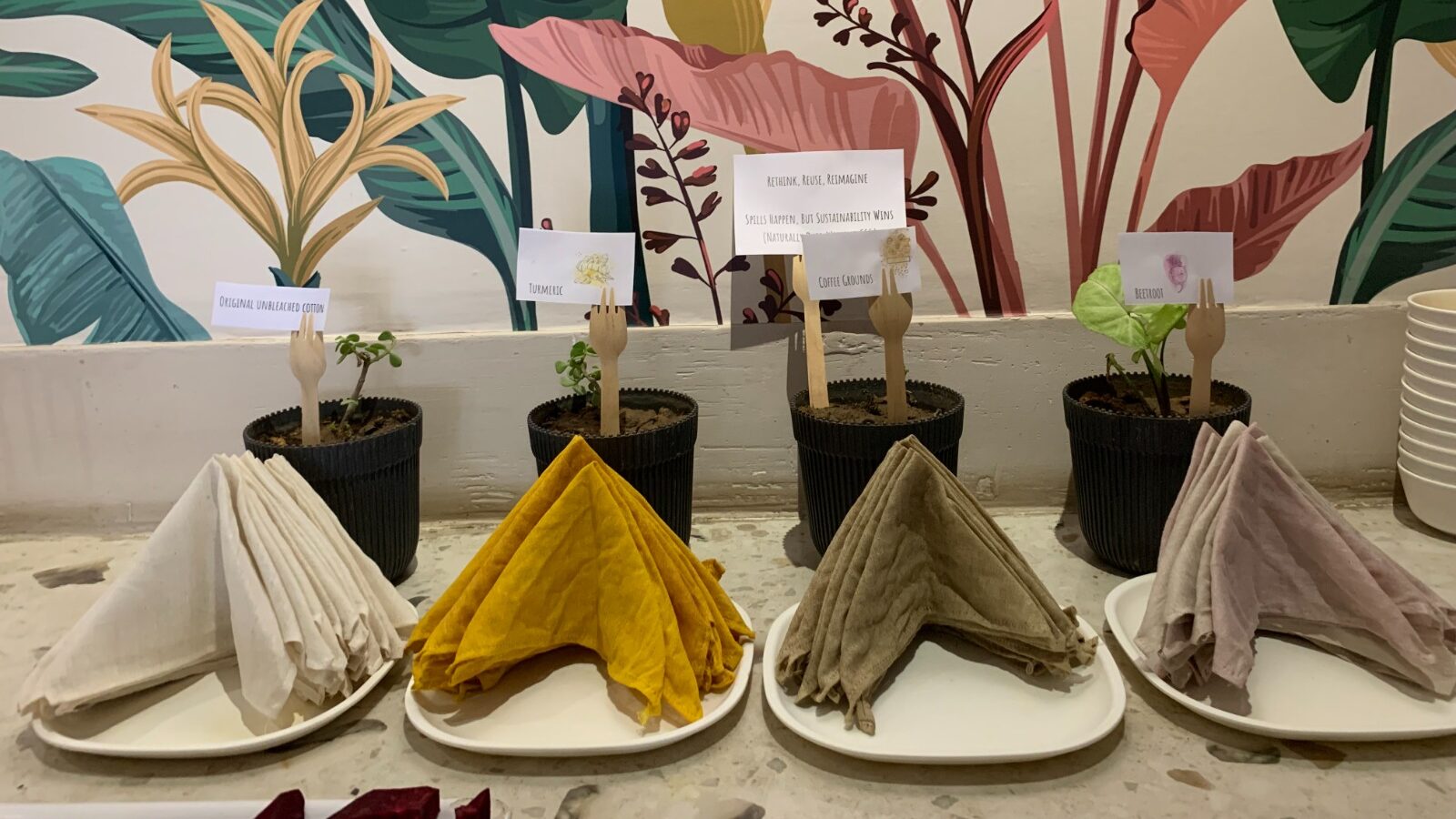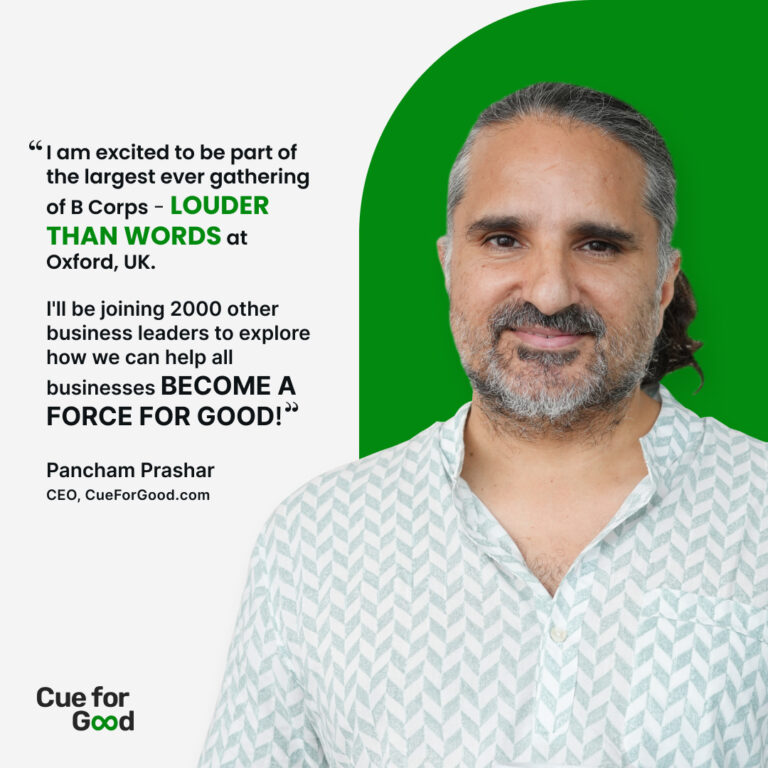
What We Learned When We Switched From Disposable Tissues to Reusable Napkins
by Nida Danish
At CueForGood (CFG), we’ve embraced a refreshing change: reusable cloth napkins. While the switch may seem minor, it’s rooted in a deeper understanding of human behavior and how small, sustainable steps can lead to a change in how we consume and use everyday things.
Our world is focused on convenience, and tissue paper is the go-to choice for many of us. While many people are unaware of just how often they reach for disposable napkins without even needing them, this small habit adds up to a significant environmental impact.
The Habit Trap: Why We Reach for Tissues Without Thinking
A major reason for the heavy reliance on tissues lies in their convenience; they’re often within arm’s reach, ample in quantity, and grabbing one has become second nature.
Psychologists suggest that people are inclined to use what’s easily accessible, without necessarily needing it.
“Use and throw” items appeal due to their convenience, perceived cleanliness, and lack of emotional attachment. They save time, reduce decision-making, and fit an abundance mindset, making them psychologically easy choices.
When tissues are readily available, we tend to reach for them by habit rather than necessity. But as we move away from placing tissues in convenient spots, we realize that we don’t need them as often as we thought.
Habits are formed through a cycle: cue, craving, response, and reward. This process, outlined in James Clear’s Atomic Habits, explains why we instinctively grab tissues even when we don’t need them.
- Cue: Tissues are placed in convenient spots – on desks, counters, and bags. Their accessibility triggers automatic behavior.
- Craving: The promise of a clean or dry surface satisfies an immediate need, even if it’s not urgent.
- Response: Grabbing a tissue becomes second nature, requiring no effort or thought.
- Reward: The act feels satisfying, reinforcing the behavior for next time.
This mindless habit comes with a cost. From deforestation to water consumption, tissue use has a significant environmental footprint. Breaking the habit begins with awareness.
The Environmental Toll of Tissues
Disposable tissues may be small, but their production involves significant environmental costs:
- Deforestation: Millions of trees are logged yearly for tissue production, often from natural forests. This contributes to biodiversity loss and reduced carbon absorption.
- Water and Energy Use: Producing tissue paper is water-intensive and energy-heavy, relying on fossil fuels for drying processes.
- Chemical and Plastic Pollution: Chlorine bleaching and plastic packaging contribute to chemical runoff and pollution, harming ecosystems.
Despite these impacts, many of us continue to use tissues without questioning their necessity. So, how can we break free?
Breaking the Habit: Overcoming Psychological Barriers
At first, we made sure plenty of cloth napkins were available as replacements for disposable ones. Surprisingly, no one complained about the change. Over time, we noticed a shift: people didn’t need the cloth napkins as much anymore. It became a natural habit to use reusable alternatives, and the need for any napkin – paper or cloth – dropped significantly. This shift proved that small changes can lead to lasting habits, with less reliance on single-use products over time.
This shift underscores an important takeaway: sometimes, simply removing the convenience factor of disposables helps people rethink their actual needs.
Switching from disposable tissues to reusable napkins is as much a psychological challenge as an environmental one. Habits thrive on ease and convenience, so disrupting them requires strategic changes:
- Make It Invisible: Remove tissues from visible, easy-to-reach spots and prominently display reusable napkins instead. This subtle shift prompts more mindful choices.
- Increase the Effort: Store tissues in less accessible places, such as high shelves, while keeping cloth napkins readily available. The added inconvenience discourages tissue use.
- Manipulate the Reward System: Replace the fleeting satisfaction of disposables with the lasting gratification of sustainable alternatives. For example, personalize reusable napkins with organic dyes, making them both functional and appealing.
Inspired to Make the Sustainable Swap?
If you’re interested in making the switch, start by creating or purchasing a set of cloth napkins. DIY napkins can be made easily at home from old fabrics such as cotton or muslin.

For a visual tutorial on how to go about it, watch CFG’s reel on how we dyed reusable napkins at the office using organic colors such as coffee, turmeric, and beetroot.
In Conclusion: Rethink, Reduce, Reuse
The sustainability journey begins with rethinking small choices. At CFG, replacing tissues with reusable napkins has reshaped our habits, reduced waste, and reinforced our commitment to the planet.
If you’re also making small, sustainable shifts in your workplace or home, we’d love to hear how. Have you tried switching to reusable napkins or other eco-friendly alternatives? Let us know in the comments.
- About the Author
- Latest Posts
Formerly an English trainer, a dearth of creativity led me into the world of digital marketing. I now channel my linguistic prowess as a Content Strategist at CueForGood.
-
Jiva’s Organic Traffic Growth: 354% Surge in 6 Months | CueForGood
by Nida DanishSummary: Jiva’s efforts to empower smallholder farmers weren’t gaining the digital traction they deserved. With a strategic overhaul led by …
Continue reading “Jiva’s Organic Traffic Growth: 354% Surge in 6 Months | CueForGood”
-
What We Learned When We Switched From Disposable Tissues to Reusable Napkins
by Nida DanishAt CueForGood (CFG), we’ve embraced a refreshing change: reusable cloth napkins. While the switch may seem minor, it’s rooted in …
Continue reading “What We Learned When We Switched From Disposable Tissues to Reusable Napkins”
-
Of Light, Laughter & Transformation: Diwali 2024 at Cue For Good
by Nida Danish
On any given day, walking into the Cue For Good office feels like stepping into a space with heart. It’s …
Continue reading “Of Light, Laughter & Transformation: Diwali 2024 at Cue For Good”
-
Why PHP Still Matters in 2024: A Look at Its Continued Relevance
by Girish TiwariAt its peak in the early 2010s, PHP powered the majority of websites globally, including major platforms like Facebook and …
Continue reading “Why PHP Still Matters in 2024: A Look at Its Continued Relevance”
-
How Meta’s New Holiday Ad Features Can Transform Your Business This Season
by Charanjeev SinghThis year, Tapcart’s 2024 BFCM Consumer Trends Report suggests that nearly 60% of shoppers kick off their holiday shopping in …
Continue reading “How Meta’s New Holiday Ad Features Can Transform Your Business This Season”
-
Cue For Good’s Journey at the B Corp Festival 2024: Exploring Louder Than Words
by Pancham PrasharOn September 10th and 11th, 2024, I had the incredible experience at the “Louder Than Words” B Corp Festival, held …
Continue reading “Cue For Good’s Journey at the B Corp Festival 2024: Exploring Louder Than Words”






